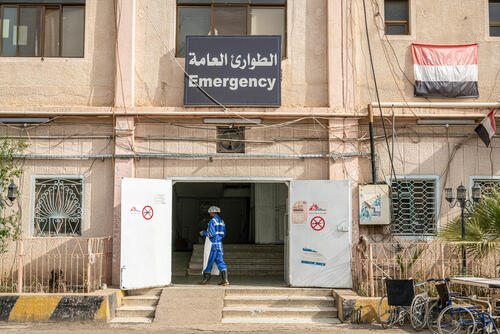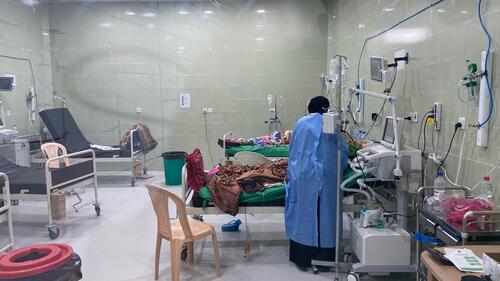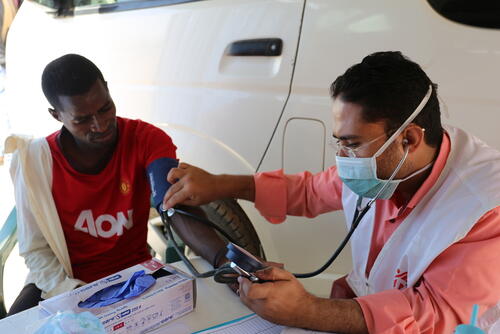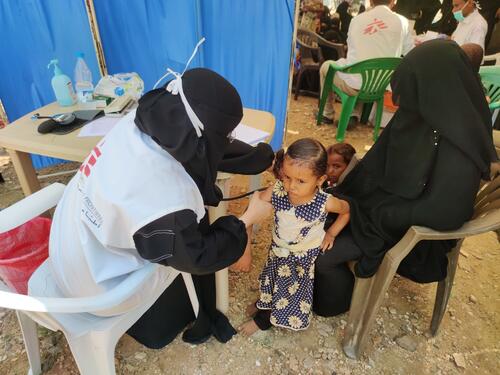The United States government has moved to designate Ansar Allah, the Yemeni group that controls Sana’a, the largest city in Yemen, and much of the country, as a “foreign terrorist organisation”. This means that sanctions will be applied to stop people and companies working with them or the institutions they control. Marc Schakal, MSF’s programme manager for Yemen, explains what the risks are for aid to Yemen – and the Yemeni people – if there is not a broad exemption for allowing humanitarian work to continue under these sanctions.
Why is MSF concerned about these sanctions? Aren’t we taking sides in a political dispute?
MSF is concerned about these sanctions because so far it is unclear how they will affect humanitarian work. Broad sanctions of this sort could discourage or prevent humanitarian organisations and the companies they rely on from working in Yemen, which would then have dire effects on the many Yemenis who need aid.
The picture people have of aid is the doctor attending to the patient, but it is much more than that: it is the plane that gets the doctor to the country; the bank transfers that mean her local colleagues can be paid; and the ship that brings the medicines and other medical equipment.
If the airlines, banks and shipping companies do not know for sure that the US will not seek to punish them for helping us move items or money to Yemen, then they might refuse to provide us with their services, disrupting the ability of that doctor at the end of the supply chain to look after their patients.
If the... companies do not know for sure that the US will not seek to punish them for helping us move items or money to Yemen, then they might refuse to provide us with their services, disrupting the ability of that doctor... to look after their patients.Marc Schakal, MSF’s programme manager for Yemen
As MSF, we run or support hospitals and clinics in 13 governorates across Yemen, including in the parts of the country controlled by Ansar Allah. Therefore, we are required to work inside the system that they control: for example, to bring lifesaving medication and medical equipment to the country we are required to coordinate with them and pay fees.
We also work collaboratively with the Ministry of Health in places such as Khamer, where we jointly run a hospital, and where we pay to top-up the salaries of government healthcare workers, many of whom have not been paid for years. These are things that could technically be rendered illegal by the US designation, and will become much more difficult to do if there are not sufficient exemptions.
What is the situation like in Yemen today? Is MSF worried about a famine in the country?
This is coming at a time when the Yemeni people are suffering the effects of six years of war. The healthcare system has been destroyed. The price of food and fuel is increasing, with the economy in meltdown. We know that COVID-19 made many people sick, and that many people died, but it is impossible to know how many exactly because there was very little testing done, and the results of tests carried out in areas controlled by Ansar Allah were not released publicly by them.
It is already very difficult, therefore, to provide aid to those Yemenis who need it most, and despite all that we and other organisations do there are many unmet needs in the country. Restrictions and obstacles imposed by authorities are a permanent feature of working in Yemen, particularly in the north of the country.
To have yet more difficulties added on top of that – it’s very concerning. Delays in providing aid will mean people will lose their lives.Marc Schakal, MSF’s programme manager for Yemen
Administrative difficulties to get visas for specialist staff and enormous difficulties importing supplies add frustration and complexity. And there are areas where insecurity makes it difficult to travel. So to have yet more difficulties added on top of that – it’s very concerning. Delays in providing aid will mean people will lose their lives.
There are a lot of worries about how the sanctions might further raise the cost of living people that are already struggling to make ends meet. Contrary to some, we have never seen evidence of a famine in Yemen, a situation where there is simply no food in the market.
There is food in the country, but its price has been increasing throughout the last years, making it more and more unaffordable for many people. The prospect that these sanctions could simultaneously make food yet more expensive and make humanitarian aid scarcer is obviously deeply worrying.
What does MSF want to see happen?
We are calling on the US government to immediately grant the broadest possible exemptions for humanitarian activities so as to lessen some of the expected consequences of the sanctions.
In addition, sectors that humanitarian activities depend upon – including shipping, financial services, insurance, and telecommunications – need to be told clearly that the designation does not target humanitarian action and maintaining essential services does not pose a legal risk for them.
We are calling on the US government to immediately grant the broadest possible exemptions for humanitarian activities so as to lessen some of the expected consequences of the sanctions.Marc Schakal, MSF’s programme manager for Yemen
Any licensing system for the granting of humanitarian exemptions also needs to be as swift and as simple as possible, and people should not face sanctions for their engagement in humanitarian activities.
There is still a chance for the US government to head off some of the negative effects of these sanctions for humanitarian actors and Yemenis in general. It is urgent that they do everything possible to reduce the harmful effects on the Yemeni people.






